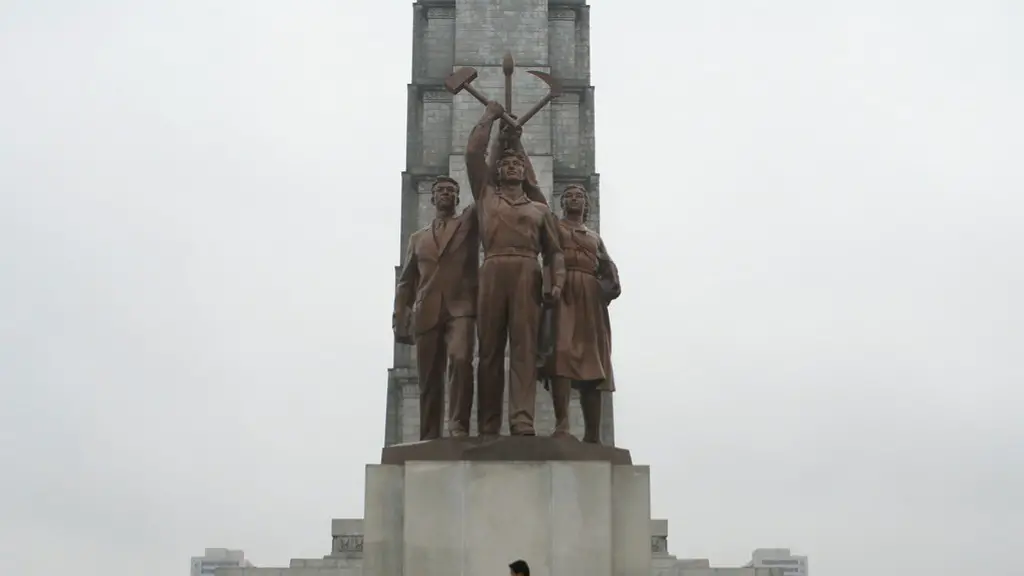Authoritarianism
North Korea is a single-party state governed by the Workers’ Party of Korea (WPK). The WPK is led by a hereditary dictator and the government is termed “authoritarian” by most experts, meaning the power to control society lies in the hands of a small elite. The WPK has long maintained an iron grip on power, and citizens have limited political rights and liberties. The WPK regularly employs mass surveillance, state-sanctioned indoctrination and indoctrination of the worker’s culture in order to separate the masses from any sense of self-governance.
The North Korean constitution states that the country is guided by the socialist ideology of Juche, which combines Marx and Lenin’s teachings with the notion of self-reliance. The constitution also outlines the role of the WPK as the “organizer and guide of all the Korean people’s democratic political life.” Under the Juche ideology, the government’s primary functions are centered around preserving the safety of the country and the interests of the ruling elite.
Censorship
The WPK also heavily censors the media in North Korea. The censorship apparatus is omnipresent, with strict controls over the production and dissemination of all forms of media. A pervasive propaganda campaign runs throughout the country, designed to propagate the cult of personality around theKim dynasty and extol the accomplishments of the state. All forms of journalism, media and entertainment must adhere to strict government guidelines, which are strictly enforced.
Arguably the harshest censorship measure employed by the North Korean government is its Internet and telecommunications blackout. North Korea is one of the only countries in the world with no web access and little to no access to modern communication tools, such as cellphones and wireless networks. Furthermore, the government has a ban on all foreign media, strictly controlling what is available to the populace.
Pressure Tactics
The WPK uses a variety of repressive tactics to pressure citizens into compliance with the government’s dictates. These include the use of political prison camps, the death penalty, and the use of torture and other cruel punishments. In addition, the government also uses bribery, coercion, and threats to ensure loyalty to the state.
Recently, the WPK has instituted a policy of “group punishment” where families are punished for the alleged misdeeds of one member of the family. This has made it even more difficult for citizens to voice their opinions, as doing so can lead to retribution even if the speaker is not the party being targeted.
Human Rights Abuses
The North Korean government perpetrates extensive human rights abuses against its citizens. Prior to the pandemic, reports emerged of starvation, deaths in custody, torture, forced labor, and other crimes against humanity. In addition, several United Nations reports have chronicled eyewitness accounts of a brutal gulag system of political prisons, where prisoners were subjected to harsh conditions, torture, and in some cases death.
The North Korean government is particularly notorious for its treatment of political prisoners. It has been reported that some political prisoners have been held in inhumane conditions for years, and in some cases have been executed without even being charged with a crime. In addition, reports of torture and inhuman treatment of prisoners have been rampant for many years.
Women’s Rights
The North Korean government also perpetrates grave violations of women’s rights. Women are not protected under the law and are often forced into labor or marriage. There are also reports of coercion into prostitution, although this issue has been largely underreported. In addition, while North Korea has made efforts to improve access to healthcare and education, gender disparities remain significant.
In the workplace, women are typically paid less than men and are discouraged from joining the workforce. Furthermore, despite some efforts to change societal attitudes about women, patriarchal attitudes remain widespread. This has widespread implications for women’s quality of life, as it is difficult for them to make economic gains or assert their rights without fear of retribution or discrimination.
Effects of the International Community
The international community has exerted considerable pressure on the North Korean government over the last several decades in an effort to address human rights abuses. The United Nations Security Council, for instance, has imposed a series of economic sanctions against North Korea in an effort to impede their nuclear weapons program. Additionally, the United States and its allies have implemented a campaign of diplomatic and economic isolation, which has resulted in a sharp decline in North Korea’s international trade and severely limited its access to international capital.
Despite this increased pressure, the North Korean government remains largely unresponsive to international efforts to improve its human rights record. This is largely due to the fact that the Kim regime considers any change to its system of rule a threat to its security and stability. As a result, the North Korean government is unlikely to make any substantial attempts to ameliorate the human rights situation in the country in the near future.
Economic System
North Korea’s economic system, like its political system, is based on central planning. This means that economic decisions are made by the government and handed down to the population, as opposed to market incentives determining the allocation of resources and investment. While North Korea’s economic system is not as rigid or oppressive as its political system, it remains largely inefficient and vulnerable to external events.
While sporadic attempts at economic reform have been made in the past, the Kim regime remains largely resistant to any substantial change. This has resulted in anchronistic economic structures, where outdated technologies and inefficient methods of production are employed. Furthermore, North Korea has been unable to develop more modern industries and develop relationships with international investors. This has severely limited its access to international capital and made it prone to economic shocks from abroad.
Foreign Relations To China and South Korea
North Korea has a complex relationship with both China and South Korea. On one hand, North Korea has relied heavily on Chinese economic and political support in order to stave off economic collapse. On the other hand, North Korea remains technically at war with South Korea, and a large majority of its budget is dedicated to maintaining a large military presence.
China and South Korea have been attempting to bring North Korea out of international isolation and encourage it to become more economically and politically integrated. In recent years, China has made attempts to engage North Korea in economic exchange and normalize relations, while South Korea has pushed for greater reconciliation and reunification.
Despite these efforts, North Korea remains largely isolated. It maintains a hardline stance on any potential foreign relations, opting to pursue autarky and a policy of self-reliance. However, as the situation on the Korean Peninsula continues to evolve, it is possible that North Korea may be more willing to open up in the coming years.
Outlook for the Future
Given the current state of affairs in North Korea, it is difficult to accurately predict the future. However, there are a few key factors that are likely to continue impacting the country’s outlook.
First, the United States, China and South Korea will continue to influence North Korea, both politically and economically. The US-North Korea relationship is particularly important, and changes in its dynamics will likely have an outsized impact. Additionally, North Korea’s foreign relations will remain fractured and uneasy, as the country is unwilling to compromise on its core ideological positions.
Second, the Kim regime is likely to remain in control of the country, as there are no viable alternatives. This means that North Korea’s policies and politics are likely to remain largely unchanged. Finally, North Korea is likely to remain an isolated, authoritarian state, as its system of rule is rooted in a deep cult of personality and is resistant to any attempts at reform.


